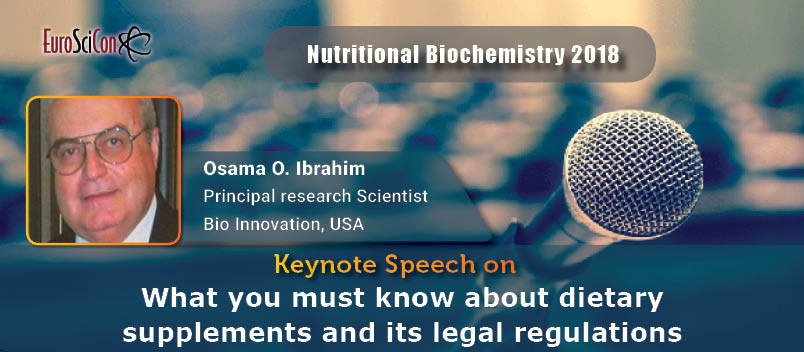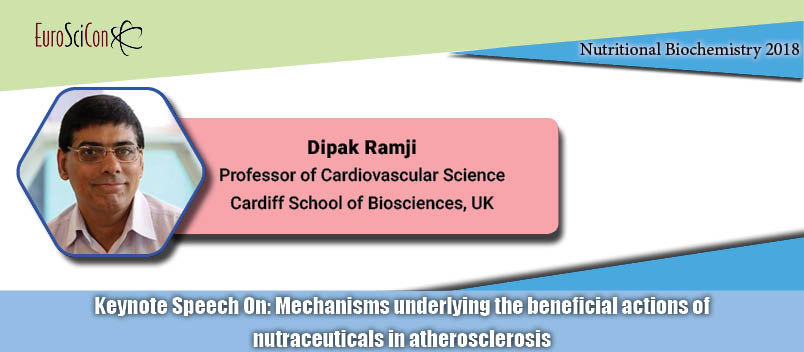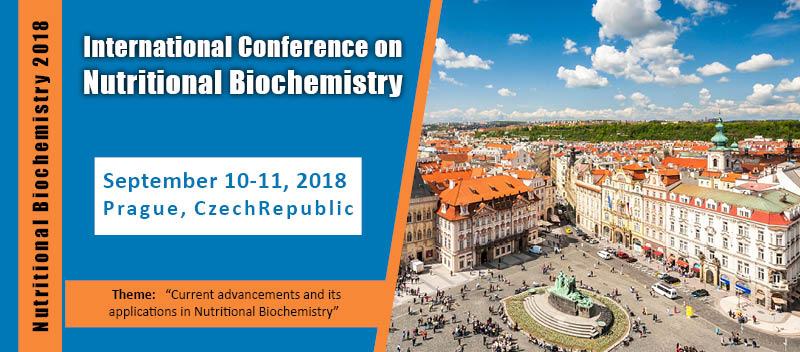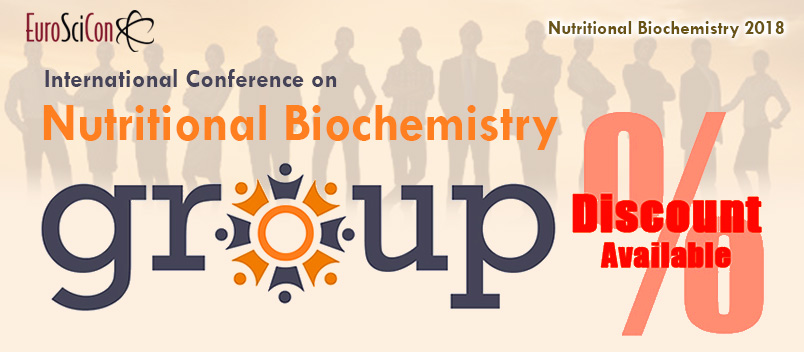nutritional biochemistry 2018
ABOUT CONFERENCE
On behalf of Nutritional Biochemistry 2018 Organizing Committee, we are pleased to invite Academics, Counsellors, Clinical Nutritionists, Registered Dieticians, Health-Care Professionals, Researchers and Scientists, Training Institutes, Universities and Colleges Students, Nutrition and Dietetics Associates, Nutrition and Dietetics based Companies, Business Entrepreneurs, Research scientists, Self-help group facilitators, Social workers, Teachers, Business delegates and Young researchers across the world to attend International Conference on Nutritional Biochemistry which is to be held on September 10-11, 2018 at Prague, Czech Republic. The conference highlights the theme “Current Advancements and its Applications in Nutritional Biochemistry”. Nutritional Biochemistry 2018 will provide health practitioners a study of the key role of nutrition, Food Science and Public Health in health and healing.
Nutrition Conferences 2018 is pleased to invite Academicians, scientists, researchers, educators, professionals, practitioners, Nutritionists, Dietitians, Public Health, Sports Nutritionists, Probiotics Researchers and students to exchange ideas and be informed about the latest research developments in the field.
These Nutrition Conferences proceedings include symposiums and workshops, keynote speeches, plenary talks, poster sessions and panel discussion on latest research developments in the field of nutrition and dietetics.
International Nutrition Conferences will give a chance to talks on experienced sustenance related issues and difficulties in the field of nourishment. It will likewise help in advancing mindfulness and help in handling one of the basic issues of humanity.
EuroSciCon is the longest running independent life science events company with a predominantly academic client base. Our multi-professional and multi-speciality approach creates a unique experience that cannot be found with a specialist society or commercially.
Euroscicon are corporate members of the following organisations
Royal Society of Biology
IBMS
British Society for Immunology
Rare Care UK
Opportunities for Conference Attendees
For Researchers &Faculty:
Speaker Presentations
Poster Display
Symposium hosting
Workshop organizing
For Universities, Associations & Societies:
Association Partnering
Collaboration proposals
Academic Partnering
Group Participation
For Students & Research Scholars:
Poster Competition (Winner will get Best Poster Award)
Young Researcher Forum (YRF Award to the best presenter)
Student Attendee
Group registrations
For Business Delegates:
Speaker Presentations
Symposium hosting
Book Launch event
Networking opportunities
Audience participation
For Companies:
Exhibitor and Vendor booths
Sponsorships opportunities
Product launch
Workshop organizing
Scientific Partnering
Marketing and Networking with clients
Euroscicon organizes International Nutrition Meetings annually across Europe, Austria, Ireland, Germany, France, Liechtenstein, Lithuania, Finland, Luxembourg, Hungary, Italy, Norway, Poland, Denmark, Macedonia, Greece, Portugal, Romania, Czech Republic, Switzerland, United Kingdom, Belgium, Scotland, Latvia, Ukraine, Sweden, Denmark, Spain, Netherlands Russia, Bulgaria, France, with solitary subject of quickening logical revelations.
About Nutrition
Nutritional Biochemistry is the investigation of sustenance as a science. Nutritional Biochemistry manages different investigations in supplements, nourishment constituents and their capacity with respect to people and different warm-blooded creatures, Nutritional Biochemistry particularly concentrates on supplement synthetic segments, and how they work biochemically, physiologically, metabolically, and in addition their effect on illness. Nutritious Biochemical research is for the most part required after characterizing dietary and wholesome needs in wiped out and solid people and the decrease of reactions of pharmaceutical medications.
Nutritional Biochemistry keeps up with the impression of system by which eating regimen impacts human wellbeing and disease condition. It basically contributes with the properties of supplements, distinctive dietary substitutes and the investigation of their physiological, metabolic, biochemical and epigenetic capacities. nourishing natural science might be a joined kind of science since it consolidates physiology, pharmacology, solution, science, microbiology and science and executes these sciences particularly to investigation of ailment conditions, wellbeing, sustenance, and the associations that exist between them.
Topics:
Nutritional Biochemistry and Obesity
Agricultural and Food Chemistry
Dietary Supplements & Functional Foods
Nutritional Neuroscience & Eating Disorders
Nutritional Therapy & Treatments
Nutraceuticals & Medicinal Foods
Holistic & Integrative Nutrition
SESSIONS/TRACKS
Track 1: Clinical Nutrition
Clinical nutrition is the practice of analyzing if a person is consuming an adequate amount of nutrients for good health. A clinical nutritionist is concerned with how nutrients in food are processed, stored and discarded by your body, along with how what you eat affects your overall well-being. Professionals in this field assess your nutritional needs based on your family and medical history, lifestyle and laboratory tests to make recommendations on your diet and individual nutritional needs. A clinical nutritionist may provide advice on changes to your diet that may help prevent disease.
- Enteral Nutrition
- Parenteral nutrition
- Role of Nutrition in prevention of disease
- Nutritional assessment
- Nutrition and Weight Status
Track 2: Nutrition & Metabolism
Nutrition & Metabolism content focused on the integration of nutrition, exercise physiology, clinical investigations, and molecular and cellular biochemistry of metabolism. The areas of interest of Nutrition & Metabolism encompass studies in obesity, diabetes, lipidemias, metabolic syndrome and exercise physiology that have an underlying basis in metabolism. Likewise, we seek submission of manuscripts on the biochemistry of metabolism, cell signaling, molecular and cellular biology of nutrients, nutrient gene interactions and other areas that have implications for human nutrition and medicine.
- Carbohydrate Nutrition
- Nutritional Counselling
- Nutritional Biology
- Nutritional Awareness
- Nutritional Assessment
- Nutrition Properties
- Nutrition Physiology
- Nutrient Signalling
- Nutrient Intakes
Track 3: Vitaminology & Lipidology
An organic compound that the organism cannot synthesize in enough quantities and it's to be obtained through diet; thus, the fundamental quantity victuals is conditional upon the instances and the specific organism. Vitamins have various biochemical capabilities. Vitaminology is that the study of vitamins, together with their structures, modes of action, and performance in maintaining body health. whereas Lipidology is that the study of lipids that area unit a group of naturally happening molecules that accommodates fats, waxes, sterols, fat-soluble vitamins (together with nutrients A, D, E, and K), monoglycerides, diglycerides, triglycerides, phospholipids, and others. The main organic features of lipids accommodate storing energy, signaling, and performing as structural elements of cell membranes.
- Vitamins
- Enzymology
- Lipids
Track 4: Nutrition Pharmacology
These bio-actives can play a role in improving our health or preventing disease. In addition, the chair group is involved in clinical projects where nutrition, pharma and disease are coming together. It is obvious that the borders between dietary intervention and pharmacotherapy are not always very clear. Of direct practical relevance are possible interactions between food products and drugs, which can be bi-directional. Relatively new-, but promising, is the use dietary intervention or specific supplements to improve effects or reduce side-effects of drugs.
- Clinical pharmacology
- Pharmacogenetics
- Pharmacogenomics
- Pharmacoepidemiology
- Systems pharmacology
- Theoretical pharmacology
- Neuropharmacology
- Cardiovascular pharmacology
- Psychopharmacology
Track 5: Livestock Nutrition
livestock Nutrition manages production for optimal yields to ensure economic viability and to supply sufficient volumes to feed large populations. Organic farmers need to understand the nutritional needs of the livestock to produce tasty and nutritious organic animal products. The animal’s behavior, growth pattern, reproductive capacity and food production are intimately linked to the feed it consumes. The nutritional value of the feed and the feed components must be delicately balanced. The results of good organic management and good organic feed include the great taste, colour, texture, nutritional value and optimal yield of the food product. Animals, including humans, have a hierarchy of needs. The primary uses of nutrients derived from food are for general maintenance and reproduction. This channels the animal’s nutrients to survive, move and perform basic bodily functions. If there is additional energy and protein available, the animal may be able to devote resources to growth and good body condition. If your animals appear healthy but are not producing enough eggs, milk or meat for you, you may have a problem with a lack of energy and protein in the feed.
- Organic Livestock Nutrition
- Livestock Nutrition Aspects
- Livestock Protein Supply
- Health Benefits of Mushroom Nutrition
- Nonruminant Nutrition
- Ruminant Nutrition
- Animal feed
- Cheese Nutrition
- Yoghurt Nutrition
- Milk Nutrition
- Requirement and Guidelines of Dairy Nutrition
Track 6: Nutritional Biochemistry and Obesity
Nutritional biochemistry deals with various studies in nutrients, food constituents and their function regarding humans and other mammals, nutritional biochemistry specifically focuses on nutrient chemical components, and how they function biochemically, physiologically, metabolically, as well as their impact on disease. Nutritional Biochemical research is mostly involved upon defining dietary and nutritional needs in sick and healthy individuals and the reduction of side effects of pharmaceutical drugs.
Obesity is a condition of increased adipose tissue mass.1 Obesity can also be defined as an increase in body weight beyond the limits of physical requirement, as the result of an excessive accumulation of fat. Accumulation of fat, or triacylglycerol, is essentially the only way that body weight can become excessive, as other energy storage (e.g. carbohydrate glycogen or protein in liver and muscle) does not have the potential of adipose tissue to exceed the limits of requirement. Although anabolic steroids can increase lean body mass and therefore body mass, this has only been described in those already malnourished.
- Endocrinal Obesity and Hormonal Obesity
- Obesity and Diabetes
- Genetics of Obesity
- Obesity during Pregnancy
- Control of Obesity
- Advanced Treatment for Obesity
- Food & Nutrition Communications
Track 7: Agricultural and Food Chemistry
Agricultural and Food Chemistry research dealing with the chemistry and biochemistry of agriculture and food including work with chemistry and biochemistry as a major component combined with biological, sensory, nutritional, toxicological evaluation related to agriculture and food. Grouped into nine categories: Agricultural and Environmental Chemistry, Analysis and Chemosensory Perception of Flavor, Analytical Methods, Bioactive Constituents and Functions, Biofuels and Bio based Products, Chemical Aspects of Biotechnology/Molecular Biology, Food and Beverage Chemistry/Biochemistry, Food Safety and Toxicology, and Targeted Metabolomics Applied to Agriculture and Food.
- Methodologies and applications in food analysis
- Chemical reactions in food
- Food science & technology
- Fertilizers and chemicals
- Plant protection and fertilization
- Plant & animal bio technology
Track 8: Renal Nutrition & Metabolism
Renal nutrition is related to making sure that kidney patients consume right food to make dialysis efficient and improve health. Dialysis clinics have dietitians on workforce who assist patients plan meals. Popular tips are: ingesting greater high protein ingredients, and less excessive salt, high potassium, and high phosphorus foods. Patients also are counseled on secure fluid consumption tiers.
Metabolism is the chemical reactions involved in retaining the dwelling nation of the cells and the organism. Metabolism can be quite simply divided into classes: Catabolism - the breakdown of molecules to obtain energy. Anabolism - the synthesis of all compounds needed through the cells Metabolism is closely connected to vitamins and the provision of vitamins. Bioenergetics is a term which describes the biochemical or metabolic pathways by using which the cell in the long run obtains strength. Energy formation is one of the crucial components of metabolism.
- Acute kidney injury
- Chronic kidney disease
- Genetic predisposition
- Xanthine oxidase deficiency
- Polycystic disease of the kidneys
- Toxicity of chemotherapy agents
Track 9: Dietary Supplements & Functional Foods
Foods as whole foods and fortified, enriched, or increased foods or dietary elements which will reduce the chance of chronic un wellness and give a health and physiological benefit more than the standard nutrients it contains. A product intended to supplement the diet that bears or contains one or more of the following dietary ingredients Vitamins, Minerals, Herbs or other botanical, amino acids, Concentrate, metabolite, constituent, extract or combination of above ingredients.
- Herbal Supplements
- Dietary Supplements
- Whole Food Nutritional Supplements
- Oral Nutritional Supplements
Track 10: Food & Nutritional Disorders
Without right nutrients a human might also suffer from diverse nutritional problems. In fact, there are not any much less than masses of various nutritional issues which can arise depending on deficiencies of various vitamins. Each nutrient serves its’ very own motive and an absence of every nutrient will lead to its’ personal precise maladies. A number of these disorders consist of Anemia, weight problems, Impaired vision. Nutritional deficiency arises when the body is not able to absorb the essential amount of nutrients. Malnutrition occurs when the body is not receiving adequate amount of the nutrients. Nutritional Deficiencies lead to a variety of Mental Disorders.
- Mental Disorders and Depression
- Fatigue Disorders
- Iodine Deficiency Disorders
- Lifestyle related disorders
- Other inflammatory and autoimmune diseases
- Malnutrition and associated disorders
- Vitamin and Mineral Deficiency Disorders
Track 11: Nutritional Neuroscience & Eating Disorders
Despite the importance of affective processes in eating behavior, it remains difficult to predict how emotions affect eating. Emphasizing individual differences, previous research did not pay full attention to the twofold variability of emotion-induced changes of eating. Five classes of emotion-induced changes of eating: (1) emotional control of food choice, (2) emotional suppression of food intake, (3) impairment of cognitive eating controls, (4) eating to regulate emotions, and (5) emotion-congruent modulation of eating. These classes are distinguished by antecedent conditions, eating responses and mediating mechanisms.
- Anxiety Disorders
- Avoidant & Restrictive Food Intake Disorder
- Depression
- Intellectual Disabilities
- Low Body Weight
- Neural Circuits
- Neural Networks
- Rumination Disorder
- Substance Abuse
- Nutritional Value & Quality of Foods
Track 12: Nutritional Therapy & Treatments
Nutritional therapy is a complementary remedy, which can be used along orthodox remedy. Therapists may go with customers who have persistent health issues that conventional medication may additionally discover hard to deal with or with people who are interested by enhancing their health through weight diet. The dietary Therapist works closely with the consumer to conduct a holistic evaluation in their dietary requirements and to assemble a person programme for food plan and supplementation that allows you to alleviate, avoid illness. Nutritional Therapy is considered to be a complementary therapy, which can be used alongside orthodox medicine. Therapists may work with clients who have chronic health problems that conventional medicine may find difficult to treat or with individuals who are interested in improving their health through diet.
- Lipid diet
- Amino Acid Nutrition Therapy
- Nutritional Therapy
- Medical Nutrition Therapy
- Cognitive Nutrition Therapy
Track 13: Environmental Nutrition
Research in the field of nutrition has greatly contributed in finding out the essential facts about how environmental depletion can lead to crucial nutrition-related health problems like contamination, spread of contagious diseases, malnutrition, etc. Moreover, environmental contamination due to discharge of agricultural as well as industrial chemicals like organochlorines, heavy metal, and radionucleotides may adversely affect the human and the ecosystem. As far as safety of the human health is concerned, then these environmental contaminants can reduce people's nutritional status and health. This could directly or indirectly cause drastic changes in their diet habits. Hence, food-based remedial as well as preventive strategies are essential to address global issues like hunger and malnutrition and to enable the susceptible people to adapt themselves to all these environmental as well as socio-economic alterations.
- Environmental health
- Environmental vegetarianism
- Environmental engineering
- Environmental epidemiology
- Exposure science
Track 14: Diet & Appetite
In nutrition, diet is that sum of food consumed by an individual. The word diet usually implies the employment of specific intake of nutrition for health or weight-management reasons. Though humans are omnivores, every culture and every person hold some food preferences or some food taboos. This might result to private tastes or moral reasons. Individual dietary decisions could also be additional or less healthy. Appetite is the desire to eat food sometimes due to hunger or in the absence of hunger that serves to maintain the energy to sustain the metabolic activities.
- Caloric Diet
- Dietary Fats
- Dietary Fiber
- Dietary Guidelines
- Dietary Ingredients
- Dietary Intake
- Dietary Management
- Healthy diet
Track 15: Food and Nutrition
People think that food and nutrition mean the same thing, they don’t. Food refers to the plants and animals we consume. These foods contain the energy and nutrients our bodies need to maintain life and support growth and health. Nutrition, in contrast, is a science. Specifically, it is the science that studies food and how food nourishes our bodies and influences our health. It identifies the processes by which we consume, digest, metabolize, and store the nutrients in foods, and how these nutrients affect our bodies. Nutrition also involves studying the factors that influence our eating patterns, making recommendations about the amount we should eat of each type of food, maintaining food safety, and addressing issues related to the global food supply. When compared with other scientific disciplines such as chemistry, biology, and physics, nutrition is a relative newcomer.
- Food Safety & Management
- Beverages Processing
- Food and Economy
- Malnutrition and Undernutrition
- Dietician and Nutritionists
Track 16: Nutritional Epidemiology
Nutritional Epidemiology is a subdiscipline of epidemiology and provides specific knowledge to nutritional science. It provides data about the diet-disease relationships that is transformed by Public Health Nutrition into the practice of prevention. The specific contributions of nutritional epidemiology include dietary assessment, description of nutritional exposure and statistical modelling of the diet-disease relationship. Dietary assessment is moving away from the food frequency questionnaire as main dietary assessment instrument in large-scale epidemiological studies towards the use of short-term quantitative instruments due to the potential of gross measurement errors. Web-based instruments for self-administration are therefore evaluated of being able to replace the costly interviewer conducted 24-h-recalls. Much interest is also directed towards the technique of taking and analyzing photographs of all meals ingested, which might improve the dietary assessment in terms of precision.
- Nutritional Epidemiology in public health practices
- Food and nutrient
- Nutrition monitoring and surveillance
- Assessment of physical activity in nutritional epidemiology
Track 17: Food Science & Chemistry
Food chemistry is concerned with analytical, biochemical, chemical, physical, nutritional, and toxicological aspects of foods and food ingredients. The long-term goals of research in food chemistry are to understand relationships between the structure and functional properties of food molecules and to improve the nutritional, safety and organoleptic aspects of food. Food science is the study of the physical, biological, and chemical makeup of food; and the concepts underlying food processing. Today, consumers are seeking foods that are safer, tastier, more convenient, natural, healthy, good value and produced in more sustainable ways than ever before. Recent advancements in science and technology have opened new frontiers for the production and prolonging shelf life, providing convenience and health benefits, thus creating exciting and challenging opportunities to work.
- Dairy science and technology
- Food: Structure, flavor and quality
- Food microbiology
- Food economy, logistics and consumers
- Medical foods & its benefits
- Food nanotechnology & its applications
Track 18: Public Health Research
Public health is defined as the science of protecting the safety and improving the health of communities through education, policy making and research for disease and injury prevention. The definition of public health is different for every person. Whether you like to crunch numbers, conduct laboratory or field research, formulate policy, or work directly with people to help improve their health, there is a place for you in the field of public health. Being a public health professional enables you to work around the world, address health problems of communities as a whole, and influence policies that affect the health of societies.
- Globalization and Health
- Maternal, Infant, and Child Health
- Mental Health and Mental Disorders
- Healthcare-Associated Infections
- Sexually Transmitted Diseases
- Modern Public Health Practice
- Social Determinants of Health
Track 19: Nutraceuticals & Medicinal Foods
The Nutraceuticals are an un-poisonous food feature that has technically recognized wellbeing uses, together with disease medication or prevention. The realistic component of the meals must be standardized in the nutraceutical product and produced below Good manufacturing practices. Probiotic meals and beverages are dark chocolate involves probiotics and antioxidants to preserve your stomach healthful and your sweet tooth satisfied and a standard Korean side dish, kimchi is fermented and pickled cabbage that can be very spicy. Full of nutrients, calcium, and probiotics it’s a great and hot strategy to keep healthy and in addition soy naturally includes some probiotic advantages, but new soy milk products available on the market have delivered additional reside cultures.
- Diet & Cognition
- Pharmaconutrition
- Bioactive Nutraceuticals
Track 20: Holistic & Integrative Nutrition
Holistic Nutrition is that the use of everyday nutrition and feeding habits to enhance one's health. Thought medication seldom considers that poor nutrition is often one among the key contributors to a large varies of health problems. Generally known as holistic nutrition or integrative nutrition, this amorphous discipline is becoming common because it focuses on however diet and supplementation might contribute to the health objective of healing body, mind, and spirit.
- Anti-Inflammatory Foods
- Herbal Supplements
- Diet Trends
- Food-mood Connection
- Food Cravings and Addictions
- Antioxidants and Phytonutrients
Track 21: Food & Nutritional Immunology
Food and nutritional factors influences the immune responses and thereby regulate the health and the disease outcomes. Balanced diet offers an immunity of an organism against disease, by the functions of the blood cells or antibodies produced. Immunity can be enhanced by natural food consumption and the nutrients produced by those foods.
- Nonspecific Immune Cell Neurocyte
- Mannan Oligosaccharide
- Cancer Immunology
- Epidemiology Immunology
- Reproductive Immunology
- Developmental Immunology
- Immunotherapy
- Diagnostic Immunology
- Systemic Lupus Erythematosus
Track 22: Food & Nutritional Toxicology
Food toxicity may be due to the physical, chemical and microbiological hazards. The toxicity may be due to the natural elements, endogenous toxins of plant origin. Toxins can also be produced during various stages in processing. It mainly refers to the adverse effects of toxins on the consumers. Food toxicity may be the result of microorganisms or toxins contaminating the food or excessive levels of a nutrient, such as vitamin A which causes adverse health effects eventually death.
- Importance of Nutrition in Cancer Care
- Food Safety and Toxicology
- Median Lethal Dose
- Targeted Metabolomics
- Bio based Products
- Dose Response Complexities
- Computational Toxicology
Track 23: Food & Nutritional Metabolomics
Unlike other technologies (genomics, proteomics…etc.), metabolomics gives organic understanding that mirrors an individual's one of a kind hereditary unique mark, as well as way of life, eating routine and environment. Utilizing metabolomics, scientists can quantitatively dissect non-hereditary variables that are included in postgenomic and posttranscriptional change. Nutritional metabolomics is rapidly emerging to utilize little atom substance profiling to support incorporation of eating regimen and nourishment in complex biosystems research.
- Nutrigenomics and plant functional genomics
- Food safety and contamination assessment using metabolomics
- Applications of metabolomics to food processing
- Metabolomics of genetically modified crops
- Metabolomics in nutrition research
- Dietary metabolites and cellular metabolism
Track 24: Protein Science
Proteins are some of the maximum ample herbal molecules in living structures and are manner greater numerous in shape and function than different macro molecules. A single mobile can embody hundreds of proteins, each with a very particular function. Although their structures, like their capabilities, variety appreciably, all proteins are made up of one or more chains of amino acids. Proteins can play a big desire of roles in a cellular or organism. Proteins make up about 42% of the dry weight of our bodies. The protein collagen which holds our pores and skin, tendons, muscular tissues, and bones together makes up about 1 / 4 of the frame's universal protein.
- Protein nutrition
- Antioxidative stress
- Research in protein nutrition
- Enzymes in poultry nutrition
- Protein mechanism in human
- Whey protein
- Iodine deficiency disorders
MARKET ANALYSIS
Summary:
Nutritional Biochemistry the summation of all processes involved in how organisms acquire nutrients, digests them, and uses them to backing all of life’s processes.
The focused region of Nutrition Biochemistry Analyzer industry market includes North American, Europe and Asia etc., and the main country includes United States, Germany, Japan and China etc. North America is the leading region in Nutritional Biochemical Analyzers following it is the European market is the largest market for Nutritional Biochemistry Analyzers. The constant healthcare sector improvements and gigantic population base represented by the Asia Pacific region is expected to drive the importance in Asia Pacific Biochemical Analyzers market.
Nutritional biochemistry is the study of nutrition as a science. Nutritional Biochemistry deals with various studies in nutrients, food constituents and their function regarding humans and other mammals, Nutritional Biochemistry specifically focuses on nutrient chemical components, and how they function biochemically, physiologically, metabolically, as well as their impact on disease. Nutritional Biochemical research is mostly involved upon defining dietary and nutritional needs in sick and healthy individuals and the reduction of side effects of pharmaceutical drugs. The top open access journals are peer reviewed scholarly journals of Nutritional Biochemistry. Controlling information through biochemical signaling and the flow of chemical energy through metabolism, biochemical techniques deliver upward push to the complexity of life. A good deal of biochemistry offers with the systems, features and interactions of organic macromolecules, together with proteins, nucleic acids, carbohydrates and lipids, which give the shape of cells and carry out some of the features associated with lifestyles.
Importance and Scope:
Nutritional Biochemistry are important factors in the promotion and maintenance of good health throughout the entire life course. Some 60% of the 10.9 million deaths each year among children aged under five years in the developing world are associated with nutrition. Iodine deficiency is the greatest single preventable cause of brain damage and mental retardation worldwide, and is estimated to affect more than 700 million people, most of them located in the less developed countries. Over 2000 million people have iron deficiency anaemia. Vitamin A deficiency remains the single greatest preventable cause of needless childhood blindness and increased risk of premature childhood mortality from infectious diseases, with 250 million children under five years of age suffering from subclinical deficiency.
As there is rise in the number of deaths due to diseases related to nutrition, it is essential to curb its rise and ensure good health. It is essential to follow proper nutrition rich diet in order to maintain good health. The keys to good nutrition are balance, variety and moderation. To stay healthy, your body needs the right balance of carbohydrates, fats, and protein — the three main components of nutrition. Nutritional biochemistry research contributes to the improvement of public health through quality research and a better understanding of the science involved in nutrition and dietetics.
Why Prague, Czech Republic?
Prague is the capital city of Czech Republic. It is the most populous city in the Europe with a metropolitan area of over 21.5 lack inhabitants. Standing on the River Vltava, Czech Republic has been a major settlement for two millennia. has a diverse range of peoples and cultures, and more than 300 languages are spoken within Greater Pragu, Czech Republic. Prague is a leading global city, with strengths in the arts, commerce, education, entertainment, fashion, finance, healthcare, media, professional services, research and development, tourism and transport all contributing to its prominence., There is also increase in the compound annual growth rate of Nutrition Biochemistry market. Since the fall of the Iron Curtain, Prague has become one of the world's most popular tourist destinations. Like Hradcany and Lesser Town, Old Town and Josefov, New Town, Vinohrady and etc. The region city of Prague is an important center of research. It is the seat of 39 out of 54 institutes of the Czech Academy of Sciences, including the largest ones, the Institute of Physics, the Institute of Microbiology and the Institute of Organic Chemistry and Biochemistry.
Global Life science Market Share by Country:
Why to attend???
Meet Your Target Market with late business covers Nutritional Biochemistry making news which shows the colossal development in business sector esteem for Nutritional Biochemistry innovation till 2019. Since Nutritional Biochemistry interrelated with Euroscicon like Clinical Nutrition, Nutrition Pharmacology and Food Chemistry etc.. it would be an awesome open door for organizations managing Analytical instruments valuable in these fields. Likewise, numerous up and participating so as to come understudies and scientists can advantage themselves world class International workshops, symposia amid the gathering which will be directed by specialists in the particular fields.
Major Nutritional Biochemistry Related Associations around the Globe:
- The International Society for Nutrition and Functional Foods, Europe;
- Phytochemical Society of Europe, British Society of Herbal Medicine, Europe;
- The World Organization of Natural Medicine, Europe;
- Society for Medicinal Plant and Natural Product Research, Germany;
- The German Society for Nutrition Medicine, Germany;
- The European Society for Clinical Nutrition and Metabolism, Europe;
- British Association for Applied Nutrition & Nutritional therapy, Europe;
- Italian Society of Human Nutrition, Italy;
- American Nutrition Association, USA;
- International Scientific Association for Probiotics and Prebiotics, USA;
- Cognitive Neuroscience Society, USA;
- International Food Policy Research Institute, USA;
- The Food and Beverage Association of America, USA;
- The Food society, USA; Guelph Food Technology Centre, Canada;
- Japan Society of Nutrition and Food Science, Japan;
- North African Nutrition Association;
- The Association of Food Technology, Turkey;
- Probiotic Association of India (PAI);
- ESPEN The European Society for Clinical Nutrition and Metabolism;
- The Society for Clinical Nutrition and Metabolism (IAPEN);
- Idaho Potato Commission;
- International Association of Engineering and Food;
- International Association of Operative Millers;
- FAND - Italian Association of Diabetics;
- Italian Association for the Defence of the Interests of Diabetics;
- Association of Diabetes;
- Association National Italian Diabetic Athletes;
- Italian Society of Diabetology;
- International Diabetes Federation- Italy;
- Primary Care Diabetes Society;
- Australian Diabetes Society;
- Emirates Diabetes Society;
- Society for Biomedical Diabetes Research;
- Immunology Of Diabetes Society;
- American Association of Diabetes Educators;
Target Audience:
Executives/Managers and Business Delegates, Director of Laboratories, Universities, Industries, Investigators, Post Doctoral Fellows, Research & Diagnostic Laboratories, Clinical Fellows, Students, Biomedical Research organizations.
The major areas of research include Diet and Cancer, Public Health Nutrition, Dietary Bioactive Components, Nutrient-Gene Interactions, Nutrition Education and Behavioural Science, Nutritional Epidemiology, Nutritional Immunology and Inflammation, clinical nutrition etc. The latest Nutritional biochemistry research is crucial for all specialists involved with nutritionary medicine analysis, the role of nutrition biochemistry in public health, and also the identification of sensible solutions to public health issues. It is essential to conduct health and nutrition conferences in order to convey the importance of Nutritional Biochemistry.
Glance at Market of Nutritional Biochemistry:
The global market for Nutritional Biochemistry is growing at a steady rate worldwide. The Nutritional Biochemistry Market in 2002 is estimated be worth USD 38,180.9 million growing with a CAGR of 7.97% during 2007 – 2011 from USD 28,100.0 million in 2007. The Market is estimated to be worth USD 41,521.7 million in 2012 and is forecasted to reach USD 63,681.0 million in 2017. Asia Pacific is expected to account for the largest share of revenue – i.e. 40.20% - of the Nutritional Biochemistry Market revenue at USD 16,692.5 million in 2012. The segment is further expected to reach USD 30,149.1 million in 2017 with a CAGR of 12.55% during 2012 – 2017. The region is also expected to account for largest share of volume – i.e. 37.82% - of the Nutritional Biochemistry Market Volume at 1,223.9 thousand tonnes in 2012. The segment is expected to reach 1,846.3 thousand tonnes in 2017 with a CAGR of 8.57% during 2012 – 2017. The segment is also expected to have the highest growth rate during the same period.
Statistics which shows growth in importance of Nutritional Biochemistry:
Nutritional Biochemistry market Worth of $2,100 Million by 2019: New Report by Market & Markets.
Nutrition and Supplements Market Projections:
Persistence Market Research 's analysis of various markets within the larger nutrition and supplements industry provide pinpoint insights into market numbers and growth projections. Here's an overview:
- The global sports supplements market will exhibit a CAGR of 9.1% between 2014 and 2020, by which year it will stand at US$12,449 million. The sports supplements market was worth US$6,800.8 million in 2013.
- The global fatty acids supplements market will reach an estimated value of US$4,477.8 million by 2020. This market was worth US$ 1,912.0 million as of 2013, and will register a 13.1% CAGR from 2014 through 2020.
- The global mineral supplements market projections show that it will rise to US$14.5 million in 2020 from US$7.3 million in 2013. This translates into a 7.3% CAGR from 2014 to 2020.
- The global botanical supplements market is expected register a moderate CAGR of 7.5% from 2014 through 2020, rising to US$90.2 million by 2020.
- The global clinical nutrition market will experience steady growth at a modest CAGR of 4.1% from 2014 through 2020, by which year it will stand at US$48.6 billion.
- The global sports nutrition market is poised to reach US$37.7 billion by 2019, at a strong CAGR of 9% from 2013-19.
LEARN MORE
Top Nutritional Biochemistry Universities Worldwide:
European Nutritional Biochemistry Universities:
Carinthia University of Applied Sciences | University of göttingen | Wageningen University | University of Helsinki | University of Gothenburg | European University Cyprus | University of Nottingham | University of Illinois | University of Copenhagen | Universität Wien | University of Oxford | University of Cambridge | University College London | The University of Manchester | King's College London | Moscow State University | Universidade de Lisboa | Moscow State University | Lancaster University | The University of York | University of Twente | University of Valencia | Lunds university | Swiss Federal Institute of Technology Zurich | The University of Edinburgh | Catholic University of Leuven | Free University of Berlin | University of Oslo University of Southampton | Newcastle University.
USA Nutritional Biochemistry Universities:
McGill University | Purdue University | Tufts University | University of Connecticut | University of Illinois at Urbana-Champaign | Bastyr University | New York Chiropractic College | The University of Bridgeport | Boston University | Colorado State | Cornell University | Harvard University | Clemson University | University of California | University of Washington | University of Delaware | Ohio State University | Rutgers University | Stanford University | Duke University | Brown University | University of California | Scripps Research Institute | Johns Hopkins University | University of Michigan | Yale University | University of Maryland.
Asian Nutritional Biochemistry Universities:
National University of Singapore | University of Hong Kong | KAIST - Korea Advanced Institute of Science & Technology| Nanyang Technological University, Singapore | Hong Kong University of Science and Technology | The Chinese University of Hong Kong | Peking University | Seoul National University | Tsinghua University | The University of Tokyo | Osaka University | Kyoto University | Hokkaido University | University of Science and Technology of China | Nanjing University| Hanyang University.
African Nutritional Biochemistry Universities:
University of Cape Town | University of Pretoria | University of South Africa | University of the Witwatersrand | University of KwaZulu-Natal | Universities Stellenbosch | University of Johannesburg | North-West University | University of Nairobi | University of the Western Cape | The American University | University of Ibadan | Cairo University | Rhodes University | University of the Free State | Moi University | Makerere University | Cape Peninsula University of Technology | Addis Ababa University | Egerton University | University of Ghana | University of Nigeria | Eduardo Mondlane University | University of Lago | Kenyatta University | Durban University of Technology | Covenant University | Kwame Nkrumah University of Science and Technology | Mansoura University | University of Dar es Salaam | Ahmadu Bello University | Ain Shams University | Jimma University and Ethiopia | University Cheikh Anta Diop | University of Reunion | Alexandria University.
Nutritional Biochemistry Societies and Nutritional Biochemistry Associations:
European Nutritional Biochemistry Societies and Nutritional Biochemistry Associations:
Finnish Society for Nutrition Research, Finland | National Association of Nutritionist of Georgia, Georgia | Greek Society of Nutrition and Foods, Greece | Hungarian Nutrition Society, Hungary | Unit for Nutrition Research, Iceland | The International Society for Nutrition and Functional Foods, Europe | The World Organization of Natural Medicine, Europe | The German Society for Nutrition Medicine, Germany | The European Society for Clinical Nutrition and Metabolism, Europe | British Association for Applied Nutrition & Nutritional therapy, Europe | Italian Society of Human Nutrition, Italy | Society of Nutrition and Food Science, Europe | Public Health and Food Safety, Europe | Swedish Society for Clinical Nutrition, Sweden | Dutch Academy of Nutritional Sciences, Netherlands.
USA Nutritional Biochemistry Societies and Nutritional Biochemistry Associations:
Academy of Nutrition and Dietetics, USA | American Association of Nutritional Consultants, USA | Canadian Nutrition Society, Canada | National Association of Nutrition Professionals, USA | Canadian Society of Nutrition Management, Canada | International Food Policy Research Institute, USA | The Food and Beverage Association of America, USA | Guelph Food Technology Centre, Canada | North American Meat Processors Association, USA | National Association of Citrus Juice Processors, Florida | Canadian Association of Holistic Nutrition Professionals, Canada | Animal Nutrition Association of Canada, Canada | Ontario Society of Nutrition Management, Canada | Brazilian Society for Food and Nutrition, Brazil | Argentine Society of Nutrition, Argentina | Mexican Federation of Societies of Nutrition, Mexico.
Asia-Pacific Nutritional Biochemistry Societies and Nutritional Biochemistry Associations:
National Institute of Nutrition, India | National Institute of Nutrition and Food Safety, China | Japan Society of Nutrition and Food Science, Japan | Japanese Society of Soil Science and Plant Nutrition, Japan | Japan Sports Nutrition Association, Japan | The Korean Society of Community Nutrition, South Korea | Japan Society of Nutrition and Food Science, Japan | The Association of Food Technology, Turkey | Hong Kong Dietitians Association, Hong Kong | Food & Nutritional Science Society, Hong Kong | Nutrition Society of Malaysia, Malaysia | The Parenteral & Enteral Nutrition Society of Malaysia, Malaysia | Singapore Nutrition and Dietetics Association, Singapore | Nutrition Society of Bangladesh, Bangladesh.
Nutritional biochemistry Conferences:
Job Opportunities in USA
Nutritionist|| Public Health Nutritionist|| public health nutrition consultant|| Pilgrim's Nutritionist Internship|| Dietitian/Nutritionist|| Extension Educator - Food|| Nutrition & Health (Morrill)|| Nutrition and Wellness Specialist|| Nutritionist Dietician PV|| Nutrition Consultant|| Nutrition Svcs Lead - Food & Nutrition Svcs|| Lifestyle Coach – Diabetes Prevention Program|| Nutrition Program Consultant|| Health Communications Fellowship-oash/hhs|| Nutrition Specialist|| Onsite Health Coach Extension Nutrition & Health Specialist|| Nutrition/Consumer Internship|| PT Nutritionist|| Horticulture & Nutrition Educator and Therapist|| PV Nutritionist|| Dallas-Nutrition Coach|| Pre-Registered Nutritionist|| nutrition coordinator|| Telephonic Health Coach|| Remote Nutritionist Guest Blogger|| Health and Wellness Coordinator|| Visiting Professor - Nutrition|| Health and Wellness – Chesap || Community Nutritionist|| clinical nutrition specialist|| Dietetic & Nutrition Spec III|| Wellness Consultant|| Food and Wellness Program Coordinator|| dietetics and nutrition program coordinator|| Clinical Nutrition Dietitian|| Spc|| Nutrition Services|| Adjunct/Lecturer|| Graduate Dietetics & Nutrition|| Overnight Dispatcher.
Job Opportunities in Europe
Product Owner|| Food & Nutrition|| Registered Dietitian|| Public Health Fellow|| outpatient dietitian|| nutrition assistant|| Behavioral Health Consultant Postdoctoral Resident|| nutrition attendant|| Health & Wellness Consultant PT|| Mobility Specialist|| Dining Assistant|| Food & Nutrition - various hours and shift|| Technical Support Intern|| Patient Care Partner|| Long Term Care Dietitian|| Food Service Helper|| Dietitian-Outpatient and Wellness|| Student Nurse Care Partner|| food svc worker/cashier|| Mental Health Therapist|| Yoga Instructor|| Endocrinologist|| Nutritionist-Cystic Fibrosis|| Nutritionist/Cooking Instructor|| Clinical Nutritionist/Genetics-Specialty Clinic|| Technical Feed Ingredient Sales – Southwest|| Nutritionist-Cystic Fibrosis|| Nurse Practitioner/Physician Assistant (Clinic & Home visits|| Adoption Specialist|| Competent Professional Authority (CPA).
Job Opportunities in Asia and Pacific
Associate Veterinarian|| Regional Sales Manager (Food)|| Nutritionist - Mount Sinai St. Luke's - Outpatient Clinic|| Lead Nutritionist-Egleston|| Poultry Nutritionist|| Swine Technical Director - Cargill Premix & Nutrition|| Poultry Technical Director|| Registered Dietitian - PHN II (Public Health Nutritionist II|| Nutrition Program Coordinator|| Regional Registered Dietitian- Northern Virginia|| Dietitian-Outpatient and Wellness|| Registered Nurse|| Degreed Nutritionist|| Nutritionist|| Regional Registered Dietitian- Northern Virginia
Top Nutrition Related International Journals
International Journal of Food Sciences and Nutrition|| || Nutrition Science Journals|||| Journal of Food Processing & Technology|||| Journal of Nutrition & Food Sciences|| Diversity & Equality in Health and Care|| Journal of Diabetes & Metabolism|| Journal of Obesity & Weight Loss Therapy|| Journal of FisheriesSciences.com|| Journal of Nutritional Disorders & Therapy|| Clinics in Mother and Child Health|| Health Science Journal|| American Journal of Phytomedicine and Clinical Therapeutics|| Journal of Animal Research and Nutrition|| Journal of Food and Nutritional Disorders|| Journal of Food & Industrial Microbiology|| Journal of Clinical Nutrition & Dietetics|| aternal and pediatric nutrition|| Research & Reviews: Journal of Food and Dairy Technology|| The International Journal of Applied and Basic Nutritional Sciences|| Journal of Nutrition Research|| Journal of Nutritional Biochemistry|| Fundamentals of Foods|| Nutrition and Diet Therapy
Nutrition Related Journals from Europe:
International Journal of Food Safety|| Nutrition and Public Health || Journal of Food and Nutrition Research|| Journal of Nutritional Science|| Nutrition and Health|| Clinical Nutrition ESPEN|| Clinical Nutrition Experimental|| International Journal of Food Sciences and Nutrition|| Plant Foods for Human Nutrition|| Journal of Nutrigenetics and Nutrigenomics|| Ecology of Food and Nutrition|| World review of nutrition and dietetics|| Current Nutrition and Food Science|| Journal of Nutritional Science|| Food Science and Nutrition|| Mediterranean Journal of Nutrition and Metabolism|| Nutrition and Food Science|| Progress in Nutrition|| Food and Nutritional Components in Focus|| Open Nutraceuticals Journal|| Revisit Espanola de Nutrition Humana Dietetical || International Journal of Behavioral Nutrition and Physical Activity|| Nutrition Research Reviews|| British Journal of Nutrition|| European Journal of Nutrition|| Nutrition Research|| Public Health Nutrition|| Journal of Nutrition|| Health and Aging|| Food and Nutrition Research|| Journal of the American College of Nutrition|| NFS Journal|| Journal of the International Society of Sports Nutrition|| Journal of Nutrition in Gerontology and Geriatrics|| Polish Journal of Food and Nutrition Sciences|| Nutrition Clinique et Metabolism|| Nutritional Therapy and Metabolism|| Cahiers de Nutrition et de Dietzeite||
Nutrition Related Journals from USA:
International Journal of Nutrition and Food Sciences || The International Journal of Applied and Basic Nutritional Sciences || International Journal of Food and Nutritional Science || Nutrition & Food Science International Journal (NFSIJ)|| International Journal of Nutritional Science and Food Technology (IJNF) || Journal of the International Society of Sports Nutrition || Journal of Nutrition|| Journal of Food and Nutritional Disorders || Journal of Nutritional Health & Food Science|| International Journal of Nutritional Sciences || Journal of Nutrition and Health Sciences (JNHS) || International Journal of Nutrition and Health Sciences|| American Journal of Clinical Nutrition || Journal of Nutritional Biochemistry || Proceedings of the Nutrition Society || Current Opinion in Clinical Nutrition and Metabolic Care || Journal of Nutrition|| Nutrition Reviews|| Annual Review of Nutrition || Progress in Lipid Research || Journal of Human Nutrition & Food Science|| Advances in nutrition || Journal of the Academy of Nutrition and Dietetics|| Critical Reviews in Food Science and Nutrition|| Advances in Food and Nutrition Research|| Revisit Chilean de Nutrition || Annals Venezolanos de Nutrition || Journal of Parenteral and Enteral Nutrition|| Journal of Nutrition Education and Behavior|| Nutrition and Cancer|| Nutrition and Dietetics|| Nutrition Today|| Journal of Pharmacy and Nutrition Sciences||
Nutrition Related Journals from Pacific Asia:
International Journal of Food and Nutritional Sciences (IJFANS) || International Journal of Advanced Nutritional and Health Science || Journal of Nutrition and Intermediary Metabolism || The Journal of Nutritional Biochemistry || Journal of the Academy of Nutrition and Dietetics || Nutrition|| Metabolism and Cardiovascular Diseases|| International Journal of Food Sciences and Nutrition|| Food and Nutrition Bulletin || Journal of Nutrition and Metabolism || Journal of Health|| Population and Nutrition|| Preventive Nutrition and Food Science|| Recent patents on food|| nutrition & agriculture|| Malaysian Journal of Nutrition|| Pakistan Journal of Nutrition || Asia Pacific Journal of Clinical Nutrition || Journal of Nutritional Science and Vitaminology || Chinese Journal of Clinical Nutrition


































